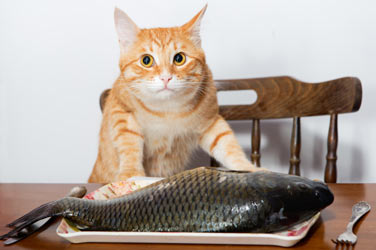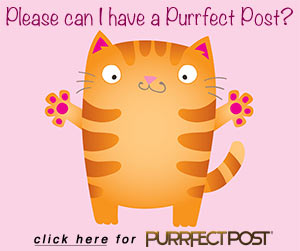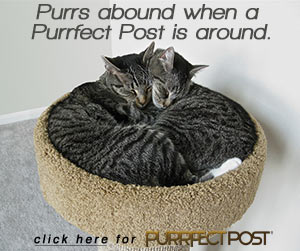Ethoxyquin, Mercury, and PCBs: Is Feeding Fish Safe for Cats?

When it comes to cat foods, there are lots of choices. Protein levels, carbohydrates, dry or wet, raw; there are so many things to think about. Fish is a popular food for cats; they love it, and many dry and canned foods contain it. But is fish a good food to feed your cat? Some of the concerns with fish as a primary protein source for cats include the use of ethoxyquin to preserve it and its mercury content.
What Is Ethoxyquin?
Ethoxyquin is an anti-oxidant used as a preservative in pet foods to prevent fats from becoming rancid. For the most part, it is not added to pet foods by manufacturers anymore but is already present in certain ingredients, especially fish meal.
Ethoxyquin is also used as a pesticide, especially on pears, and as a preservative in some human grade spices.
Why Are Ethoxyquin Levels Higher in Fish Meal?
Ethoxyquin is added to fish meal when it is processed on the boat. Fish meal is high in polyunsaturated fat. This type of fat is unstable and can spontaneously combust. Boats have sunk in the past due to this, and the US Coast Guard requires that fish meal be treated with ethoxyquin during transport.
When pet food companies buy this treated fish meal and use it, they often do not list the ethoxyquin on the label because they did not add it themselves. This is known as an "undeclared" ingredient.
Why Are Anti-Oxidants Necessary in Protein Meal Sources?
All animal protein meal sources must be treated with preservatives early in the manufacturing process in order to avoid oxidation and rancidity. The oxidation process releases free radicals that are harmful when eaten.
Are There Alternatives to Ethoxyquin?
It is possible to treat protein meal sources with natural preservatives such as Vitamin C, Vitamin E, and rosemary extract. Pet food manufacturers can specify that they will only buy products that were preserved with natural antioxidants. Meat meals that are treated with natural preservatives are more expensive and don't last on the shelf as long as those that are treated artificially with preservatives like ethoxyquin.
Is Ethoxyquin Dangerous?
There have been multiple studies on the effects of ethoxyquin, with mixed results. In the 1990's, the FDA began receiving complaints from consumers concerned that ethoxyquin had caused various health problems in their pets (mostly dogs), including:
- Allergic reactions
- Behavior problems
- Cancer
- Deformed puppies
- Infertility
- Organ failure
- Skin problems
Testing indicated that the liver enzymes of pregnant dogs fed foods containing ethoxyquin increased temporarily. No other negative outcomes were observed. The FDA requested that pet food companies lower the amount of ethoxyquin in their foods, due to these customer concerns. Many pet food companies did so, and many found alternative preservatives.
There have also been tests conducted on rats that indicate that ethoxyquin is actually protective against the development of liver cancer when the animal is also fed aflatoxin b1 (Thomas W. Kensler2, 1986). This fungal contaminant can sometimes make its way into pet foods, causing severe illness and death.
Mercury in Fish
Mercury is a toxin that is present in most fish. When too much is ingested, it negatively affects the lungs, kidneys, and brain. The amount of mercury present in fish is related to the type and size of the fish and the waters it inhabits. Tuna, a type of fish commonly fed to cats, is a large fish that tends to contain higher levels of mercury than many other fish. Albacore tuna contains more than chunk light tuna.
PCBs in Fish
Big fish at the top of the food chain, such as tuna, contain higher amounts of PCBs as well as mercury. PCBs are industrial chemicals that were banned in the US in 1979 but still persist in the environment. Research suggests that PCBs can cause multiple types of cancer. Cats that are fed primarily fish, especially tuna, may be ingesting an inordinate amount of PCBs.
Farmed fish contains higher levels of PCBs than wild caught fish does, primarily because of the diet of fish meal that they are given.
Fish is a Common Food Allergy in Cats
Food allergies cause GI disturbances and skin problems, including scratching, hair loss, and secondary infection. Fish is a common trigger for food allergies in cats.
Too Much Fish Can Result in Several Health Problems in Cats
- Cats fed large amounts of tuna fish can develop steatitis, a condition that produces fever, abdominal pain, lumps under the skin in the fatty tissue, inappetance, and pain during movement.
- Human products such as canned tuna fish don't contain all of the nutrients necessary to keep your cat healthy, especially thiamine. If you feed your cat a large amount of canned tuna fish and supplement with other cat food, your cat may not eat enough of the cat food to maintain proper nutrition because he is filling up on the tuna.
- Fish contains a high amount of iodine. Cats do not need large amounts of iodine, and some veterinary scientists believe that it may contribute to the development of hyperthyroidism.
- Fish is high in magnesium. High doses of magnesium can result in the formation of struvite crystals in cats' urine. This can lead to urinary tract disease and the emergency situation of urethral blockage in male cats.
So Should I Feed My Cat Fish?
It might surprise you to find out that fish has not been a natural food source for most cats throughout history. Cats evolved in arid regions, and their diet was usually rodents or small game. When you are making the decision about feeding fish to your cat, consider these tips:
- Don't use fish as the primary, day-in-day-out food source for your cat. When fed this way, your cat may ingest more ethoxyquin, mercury, and PCBs than is prudent.
- Don't use fish prepared for humans as a primary source of food for your cat.
- If you use canned tuna as a treat for your cat, choose light-chunk, not albacore.
- It is very difficult to ensure that there is no ethoxyquin in your cat's food, as many pet companies do not put it on the label if it is added before their manufacturing process.
- Feeding fresh fish will allow you to avoid the ethoxyquin preservative but not the mercury or the PCBs. It also isn't a balanced diet for your cat.
- Small amounts of light-chunk tuna, canned fish cat foods, or cooked, fresh, wild-caught fish are probably safe for your cat, in conjunction with a high-quality, non-fish-based food formulated for cats.
- Cats can develop an addiction to fish, causing them to avoid other foods, so care should be taken not to introduce too much of it into the diet initially. If your cat already eats mostly fish, you may need to mix the fish foods in with non-fish foods for a period of time, very gradually adding less and less fish.
References
- Thomas W. Kensler2, P. A. (1986, February 28). Modulation of Aflatoxin Metabolism, Aflatoxin-N7-guanine Formation, and Hepatic Tumorigenesis in Rats Fed Ethoxyquin: Role of Induction of Glutathione S-Transferases. Retrieved from http://cancerres.aacrjournals.org/: http://cancerres.aacrjournals.org/ content/46/8/3924.short
You May Also Like These Articles:
Fatty Liver Disease in Cats (Hepatic Lipidosis)
Feline Lower Urinary Tract Disease
Cats and Chocolate: Why is Chocolate Bad for Cats?
How To Know When Your Cat Is Sick
How To Take Your Cat To The Vet
How to Keep Your Cat from Chewing on Houseplants
Notice: Ask-a-Vet is an affiliated service for those who wish to speak with a veterinary professional about their pet's specific condition. Initially, a bot will ask questions to determine the general nature of your concern. Then, you will be transferred to a human. There is a charge for the service if you choose to connect to a veterinarian. Ask-a-Vet is not manned by the staff or owners of CatHealth.com, and the advice given should not delay or replace a visit to your veterinarian.






